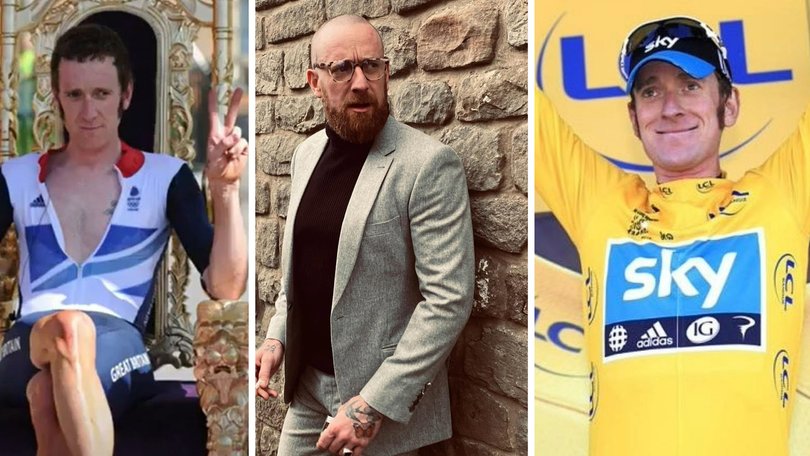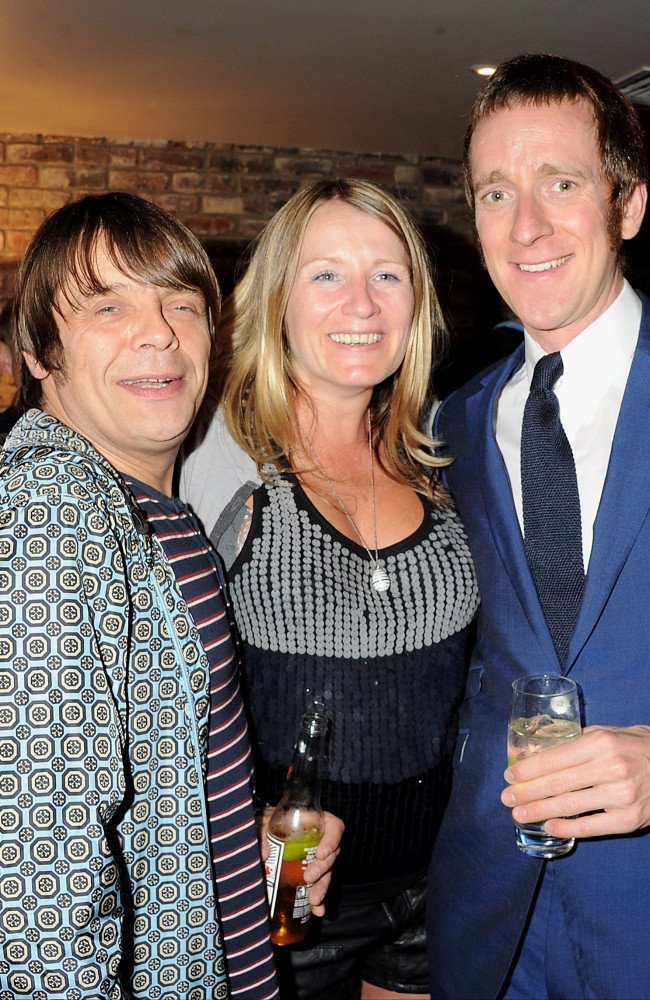Sir Bradley Wiggins is bankrupt and homeless after burning through £13 million, faces selling Olympic medals

Dismayed by the news that one of Britain’s greatest ever Olympians had been declared bankrupt, I had been trying all week to contact Sir Bradley Wiggins and hear his side of this sorry story.
Puzzlingly, he wasn’t to be found at either of the addresses in Lancashire he gave to court: an elegantly converted barn in the North Lancashire countryside and a redbrick semi 20 miles away, in the resort of Lytham St Annes.
Yesterday, when his lawyer Alan Sellers finally contacted me, he explained the shocking reasons for this.
Sign up to The Nightly's newsletters.
Get the first look at the digital newspaper, curated daily stories and breaking headlines delivered to your inbox.
By continuing you agree to our Terms and Privacy Policy.The £975,000 barn that sir Bradley once shared with his ex-wife Cath and their three children had been repossessed by a building society and sold a few months ago.
As for the semi, that had been Cath’s home, and she’d let him stay there for a while “to help him out”.
What Mr Sellers told me next would have stopped even the fleetest of cyclists dead in his tracks.
“In reality, Brad is sofa-surfing. He stays with friends and family. I don’t know where he stayed last night, I don’t know where he will stay tonight or tomorrow night. He doesn’t have an address.”
In other words, he’s basically homeless.
Hearing my sharp intake of breath, barrister Mr sellers, head of sports law at Liverpool solicitors Bond Turner, added: “I’m not surprised you are astonished. It is a total mess.
“He has lost absolutely everything. His family home, his home in Majorca, his savings and investments. He doesn’t have a penny. It’s a very sad state of affairs.”
The word sad doesn’t begin to do justice to this story. sir Bradley Wiggins is the third most decorated British Olympian, with eight medals — five of them gold.
He was the first Briton to win the coveted Tour de France. Yet his triumphs weren’t just about trophies and baubles.
For those of us who were there in that heady summer of 2012, when — in the space of just nine days — he rode to glory down the Champs-Elysees then dashed back across the Channel to recline on a golden throne at Hampton Court, after winning the Olympic time trial at London, Wiggo (as he was quickly dubbed) was the ultimate English sporting hero.
With his witty quips and muttonchop sideburns, this earthy lad raised in North London united the nation in pride in a way that hadn’t been seen since 1966.
For droves of middle-aged couch potatoes, his success was transformative.
They splashed out on racing bikes and snazzy Lycra leotards and took to country lanes, clocking their mileage on newfangled apps.
Almost overnight, Wiggo had made pedal power cool. His own life was transformed, too.
Until that golden summer he had been renowned only within nerdy cycling circles.

Yet suddenly he was jamming on stage with his hero Paul Weller (whose mod clothes and hairstyle he strove to emulate), winning BBC sports Personality of the Year, and being courted by corporate reps waving cheques.
As he later recalled, the moment he realised just how far he had pedalled came when he went to Buckingham Palace to receive the knighthood bestowed on him in David Cameron’s New Year Honours List.
Lined up alongside the great and good, he has said, he felt like “an imposter”.
One wonders, then, how sir Bradley — whose tough exterior was easily punctured when he dismounted — must feel now.
“Embarrassed,” Mr Sellers replies, when I put this to him.
“I’ve said to Bradley that what you’ve achieved can never be taken away from you. Life will be better when you’re debt free.
“And you’ve still got the support of the public. But he needs to get back on his feet, doesn’t he?”
He surely does. But given that he was earning “£2 or £3 million” at the height of his cycling career, and was reportedly worth £13 million as recently as 2017, how on earth have his financial wheels fallen off so catastrophically?
Faced with long-standing debts that have escalated to almost £1 million, his creditors — as listed at a bankruptcy hearing in Fleetwood, Lancashire, on June 3 — are many and varied.
They range from HM Revenue and Customs, owed £313,447, to a 25-year-old former rider with Team Wiggins, the cycling outfit he set up to nurture young talent, who is claiming an unpaid £583.
We tried to keep all this hidden under wraps and resolve these issues, but it had gone too far.
To repay them, sir Bradley faces losing his Olympic medals, his bespoke Tour de France trophy and totems to his glittering career.
According to an insolvency expert, it will be for the trustee Kevin Murphy to decide if they must be sold off.
One sports memorabilia valuer told the Mail the five golds alone could together fetch up to £250,000.
Since his retirement, Sir Bradley claims to see them as meaningless “junk”.
Indeed, he “smashed” his BBC sports personality trophy — a silver-plated replica TV camera — and keeps his gold medals in a Co-op carrier bag.
Even so, handing them to a bankruptcy trustee would surely compound his humiliation.
Regrettably, his life has been careering downhill since 2020, when his seemingly solid, 16-year marriage ended.
There followed a romance with his PR Laura Hartshorne. He moved into her London home, but she tells me they are no longer together.
When he moved to the Lytham St Annes semi two years ago, neighbours would see him chainsmoking as he paced back and forth outside the house, talking on his phone — though he was barely recognisable with his ginger beard and bulky physique.
Health and fitness are apparently no longer priorities for a man whose ultra-lean 6ft 3in, 11st frame once operated as efficiently as an F1 engine. (Sir Bradley says he never rides a bike these days because ‘i don’t like the person i became when i was on it’.)
Amid his traumas came sir Bradley’s harrowing admission, in an interview two years ago with former Labour spin doctor Alastair Campbell, that he was sexually “groomed” at 13 by his cycling coach — abuse which has left him emotionally scarred.
Then there have been his many attempts to redefine himself.
Since he retired from cycling in 2016, he has mooted plans to become a social worker, doctor, boxer and rower, as well as working as a TV pundit and entering a TV ski-jumping show (only to drop out when he broke his leg).
All this on top of persistent allegations that the medals he won that glorious summer were tarnished by his use of a performance-enhancing steroid.
Though he strenuously denies the claims, branding them a “malicious witch hunt”, and no rules were broken, a Commons Select Committee report said he and fellow members of the sky cycling team “crossed an ethical line”.
For all of us who followed in Wiggo’s slipstream 12 summers ago, from the tortuous alpine passes to the streets of surrey, drinking in his success, his demise is as unfathomable as it is sad. How has it happened?
According to Mr Sellers, Sir Bradley is the latest in a long line of sporting icons — from boxer Joe Louis to tennis star Boris Becker — to have fallen on hard times after entrusting their business affairs to people who didn’t act in their best interests.
“There seems to be this army of so-called advisers who quite frankly rip these people off,” he says.
“And they are so busy being sportsmen that when it comes to their financial affairs, they just get shafted. That’s what happened to Brad.”
Sir Bradley was encouraged to plough millions into investment schemes which failed, Mr Sellers claims, but not before unnamed “advisers” had taken their cut.
His lawyer says Sir Bradley hopes to recover some of his lost fortune — which amounts to the almost £1 million he owes his creditors — by taking legal action against the people he accuses of mismanagement.
This would allow him to repay his creditors, though it will be for the trustee to decide if he can go down that route.
Mr Sellers added: “We tried to keep all this hidden under wraps and resolve these issues, but it had gone too far.”
Trying to compute all this, one wonders if Sir Bradley’s problems are rooted, to some extent, in his difficult childhood, which was blighted by financial hardship and familial troubles.
His father Gary was a brutal Australian track cyclist who used amphetamines to boost his speed and sold pills to other riders.
He wooed Sir Bradley’s teenage mother Linda while riding over here and soon whisked her to Belgium, a hotbed of bike racing, where Wiggins was born.
When he was two, his father packed Linda’s clothes into a bin bag and threw her out, forcing her and Bradley to live with his grandfather George in Kilburn.
Though his beloved grandad provided security and became his role model, there was never much money.
It stayed that way long after Sir Bradley made his mark as British cycling’s rebellious, yet supremely gifted young tyro.
He was still in the red at the bank when he bagged the third of his five Olympic golds, in Beijing in 2008.
At the time, he and the pregnant Cath lived in a modest house near Chorley, Lancashire, and when he returned from China, people would ask why he hadn’t bought a swisher place. After all, he must be a millionaire.
“I had that same misconception,” he recalled, and proudly told his wife their new baby would want for nothing.
“But it just didn’t happen. I woke up every Monday morning and we were still overdrawn, and I’d think, “God I don’t feel like riding my bike again.””
He was in his late 20s before he began to reap the rewards for innumerable hours spent pedalling through the cold, wet Pennines, signing a £350,000-a-year contract with the Garmin team.
But everything really changed a few months later, when, flush with Rupert Murdoch’s millions, the new Team Sky poached him to spearhead a British tilt at the Tour de France.
They offered him £4 million over four years, an eye watering sum for a cyclist.
Three years later, having beaten the Gauls at their own game, Le Gentleman Wiggins (as the French press called him, after he chivalrously slowed down to wait for riders whose path had been blocked by a saboteur) had justified his salary . . . and then some.
Now the big bucks began to flow in.
First there was a reported £1 million win bonus, then a new £3 million-a-year contract from Sky, and lucrative deals with Halfords, Skoda cars and Fred Perry, who cashed in on the new, Wiggins-induced cycling mania with a chic range of bikewear.
Perhaps, then, by the time he won his final gold medal in Rio in 2016, he really had banked £13 million, ranking only behind Sir Andy Murray and golfer Justin Rose as the highest-earning Briton in sport.
By then his off-bike affairs were being handled by Simon Fuller’s XIX agency, who also managed footballer David Beckham and F1 star Lewis Hamilton.
They helped him start Team Wiggins, making him one of the few riders to head his own bike-racing stable, and fulfilling his laudable ambition to help grassroots cyclists maximise their potential.
XIX held a 40 per cent stake in his team, but in 2017 he set tongues wagging by switching to rival agent, M&C Saatchi Merlin.
No matter who represented Wiggo, dealing with him was seldom easy, a top PR who worked with him for several years told me.
While he couldn’t help but like Sir Bradley, and describes him as a “fantastic father”, he remembers him as “a very complicated guy” who sometimes seemed blinded to life’s practicalities.
When it came to negotiating deals, the “ethical line” he was rightly or wrongly judged to have crossed was also a stumbling block.
“The drugs thing never went away,” says the PR. “Every road led back to that same point.
With a relatively modest annual budget of £460,000, however, and a healthy number of sponsors, it certainly wasn’t the bike team that swallowed up all his money.
“I never actually heard people saying they wouldn’t deal with him, but if you put two and two together, it can’t have been good, can it?”
Whatever Sir Bradley’s faults, however, extravagance is not among them. Those who know him well agree on that.
Unlike his cycling pal, the great sprinter Mark Cavendish, who had two Richard Mille watches worth £700,000 stolen at knifepoint, he doesn’t go in for designer jewellery and flashy cars.
His only known indulgence was Team Wiggins.
As former Sky teammate, Kjell Carlstrom, observes, running a bike racing operation is a rich man’s game that tends to burn through money.
Moreover, after he retired from riding in his team’s colours, in 2016, Sir Bradley seemed to lose interest in the venture.
Insiders say he seldom watched any races, and a former employee never once met him in the two years he worked there.
So, if, as some staff say, things began to go awry before Team Wiggins folded, in 2019, perhaps he must take some of the blame for being absent.
With a relatively modest annual budget of £460,000, however, and a healthy number of sponsors, it certainly wasn’t the bike team that swallowed up all his money.
In October 2020, he wound up two of his companies: Wiggins Rights Ltd, liquidated with debts of £654,657, and New Team Cycling Ltd, which owed £587,008.
The following year, it emerged that he had entered into an Individual Voluntary Arrangement (IVA) over a £760,373 loan that he had taken out as a director.
This is an agreement with creditors to settle all or part of one’s debts by making regular payments to an insolvency practitioner.
He agreed to pay back £600,695, largely from the intended sale of his property in Majorca, but by September 2022 the amount he owed had spiralled to £979,953 and bankruptcy proceedings soon began.
With typical bluntness, Sir Bradley told Cycling Weekly he had been left to deal with “a ‘s***pile with my name at the front of it”.
He added: “Happens to a lot of sportsmen while they’re doing the grafting.”
Indeed so, but as his lawyer says, his magnetism remains undiminished.
Sporting a ginger beard these days, and several stones heavier than in his racing days, yesterday he was the star act at a lunch in Cardiff, where the best tables sold for £1,800.
On Sunday he will doubtless pull crowds to the National Cycling Show, in Birmingham, and more such appearances are planned.
We must hope he can ride out this crisis with the undying grit that left lesser riders in his wake.
The much-loved Olympian might have no home and owe hundreds of thousands.
Yet for bringing us that unforgettable summer the nation will be forever in his debt.
- Additional reporting by Tim Stewart and John Kelly
